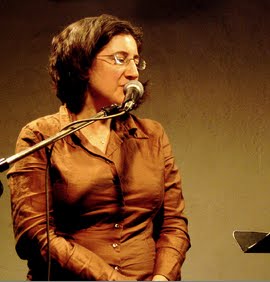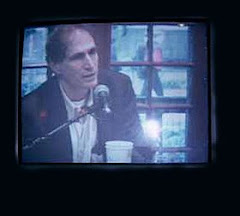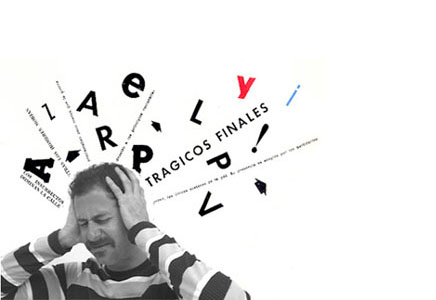 LISTEN TO THE SHOW
LISTEN TO THE SHOWEzra Pound integrates - or, rather, doesn't quite integrate - a response to a stupid contemporary judicial ruling on censorship and a fragment from the Canticle of Simeon (Luke, 2:29-32) to make a powerful, comic (even schticky) satire on American culture of his time and perhaps of ours. How this works, variously (and depending too on which recording of Pound reading the poem you hear), is the topic of our twelfth PoemTalk. Talkers this time: Charles Bernstein, Joshua Schuster, Rachel Levitsky.
How broad is the satire? Is the figure whose sleep is troubled by Americans reading classics widely the anxious, sensorious judge, relieved that no one really reads the indecent classics? Or is he the modernist poet, aiming for whatever would strike such a man as indecent? (Is this just another early-Pound personae? Is it the performance of a subject position Pound would never quite occupy? Does the speaker's elitist animosity toward America confirm the judge's disquietude?
PennSound's Pound collection (it's complete - everything recorded by Pound that we know of) includes several readings of "Cantico del Sole." PoemTalk plays two of them, one from the 1930s, the other from the late 50s.
The thought of what America would be like
If the Classics had a wide circulation
Troubles my sleep,
The thought of what America,
The thought of what America,
The thought of what America would be like
If the Classics had a wide circulation
Troubles my sleep.
Nunc dimittis, now lettest thou thy servant,
Now lettest thou thy servant
Depart in peace.
The thought of what America,
The thought of what America,
The thought of what America would be like
If the Classics had a wide circulation...
Oh well!
It troubles my sleep.
PoemTalk's director, engineer and editor is Steve McLaughlin, who, by the way, has recently taken a turn at selecting his 12 favorite PennSound recordings.
This episode of PoemTalk was recorded in the Arts Cafe of the Kelly Writers House in Philadelphia. Next time, PoemTalk goes on the road - to our Broadway studios in New York, for a discussion of a late poem by Wallace Stevens and the talkers are Nada Gordon, Lawrence Joseph, and Charles Bernstein. Stay tuned.
- - -
Tim Carmody reminds us of this later Poundian remark about Americans' reading habits: "This crisis as I see it was and is at the moment I write this (July 22, 1930) due to a fear that the American public is too stupid to buy books without buying bindings. The continental European buys books in paper covers at 50 or 60 cents per volume in order to see what is in them very much as the American buys magazines." (Pound, "How to Write," Machine Art and Other Writings: The Lost Thought of the Italian Years, ed. Maria Luisa Ardizzone [Durham, NC: Duke University Press, 1996], p. 90.)
- - -
Mike Hennessey's PennSound daily did a feature piece on this episode of PoemTalk, providing a good summary of the discussion and some helpful links. Go here for more.


























4 comments:
Nice installment! Here's a sequel to "The Classics Exposed," from one of the World War Two radio broadcasts:
"A plot was outlined years ago to blot out classical scholarship, to blot out the historic sense. It went about on soft paws, making no noise, it was DEADLY.
"It worked while the nations slept. A contempt for the Latin authors. The idea Greek was useless. The concentration on innocuous authors. Erotic poems and NOT the state of life as shown in the Athenian law courts.
"The aesthetic angle, that the whole of my generation grew up in, all LOOKING harmless, so HARMLESS."
And then it goes off on a few tangents before returning briefly to the classics:
"You could get down to the usury swindles, lit up by Demosthenes. Will you wake up to the fact that the gradual elimination of the classics had a purpose, a damn dirty purpose? Get boiled down to a few harmless authors, say to Tibullus and Virgil, taste for the unreal in poetry, and the student's eye got off the reality."
That does, I think, shine a little light on the poem, or at least on the 1939 performance, which dates from roughly the same moment.
Ben Friedlander
Thanks for this interesting podcast! Personally (well, I'm a musician, aren't I?) I find the song refs. to be key here. St. Francis is said to have recited the Cantico del Sole (one of the first pieces of Italian poetry on record) on his deathbed (hence direct connection to Simeon). And of course the Nunc Dimittis: standard canticle of the Anglican church. As if Pound were saying, "puhleeze, just let me die!" re American anti-intellectualism manifested by decline of the classics. But it's got interesting implications -- Francis stood in contradistinction to Dominic, and the Franciscans were certainly viewed as an anti-intellectual movement (a concern for the church hierarchy), quite the other side of the coin from the Dominicans ("the preachers").
The Anglicans (it's clear that Pound is referring to the Anglican liturgy, Nunc Dimittis being the [Latin] title of the vernacular canticle sung at daily Evensong in Anglican churches to this day) were of course interested in moving *away* from Latin to the vernacular.
If Pound alludes to one of the most prominent Catholic anit-intellectuals [too strong, I know, but that's how he was perceived], via one of the first Italian poems that has come down to us, in tandem with allusion to the "vulgar language" instantiation of the Song of Simeon, the irony is quite phenomenal.
Bob
mhjj hhh hh
I can't sleep without Ambien now.
Post a Comment